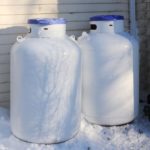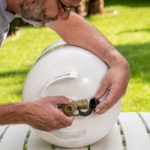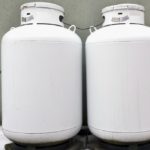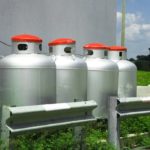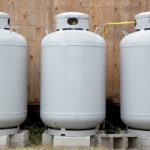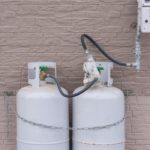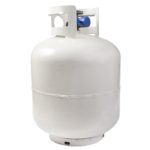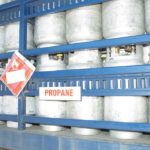Many of us love using propane tanks on warm summer days when the mood is just right for lighting up the gas grill and relaxing with family and friends on the deck or in the park. But where are you supposed to keep the propane tank once the temperature plummets and you huddle inside for the winter?
While propane tanks won’t explode in the cold, it’s still important to store them properly during the winter. Aim to keep tanks at temperatures higher than around -44oF/oC to prevent loss of pressure and propane depletion, and try to refill them before winter even starts if you can.
If you only use your propane tank during the summer, there are several important steps you need to keep in mind to ensure proper winter storage. Let’s look at how lower temperatures affect propane tanks, if they freeze and explode in the cold, and how you should store the tank in winters so that no harm comes to you or your family.
How Does Cold Affect Propane Tanks?

During winters, the cold can wreak havoc on the liquid propane in your tank. Freezing temperatures negatively affect the fuel in two ways:
Loss of Tank Pressure
There is a drastic drop of pressure inside a propane tank during the colder months. Each tank contains liquid propane, which is then converted into gas and released through a valve.
However, when the temperature drops within the tank to around -44˚F, the liquid loses its ability to convert into gas. As a result, you cannot extract or use the propane until the temperature rises.
Propane Depletion
The drop in temperature significantly reduces the amount of propane inside the tank. Colder temperatures shrink propane, resulting in inaccurate gauge readings.
Once the propane depletes, you’ll have no choice but to refill the tank, wasting both your time and money.
How Cold Is Too Cold for Propane?
Propane remains in its liquid form at any temperature above around -44˚F/˚C. With a small amount of gaseous propane in the tank, your propane appliances won’t be able to work properly because the cold propane doesn’t form a pressurized vapor in the way that equipment using it is expecting.
Although most areas don’t receive such harsh winters, it’s still advisable to keep the propane tank in a comparatively warmer area, as even temperatures above -44˚F/˚C can negatively affect your propane tank.
While you might not be a fan of grilling in the winter, you’ll still need a propane tank to power other appliances in your home, like a garage heater, water heater, stove, and fireplace. Make sure that you store your propane tank properly in the cold, so you don’t find yourself without heat right in the middle of winter.
You can maximize tank pressure via both temperature and fluid levels. In simpler words, you can maintain tank pressure by keeping the tank full at all times or by keeping it in an area with a consistently warm temperature.
Can Propane Tanks Freeze and Explode?
Fortunately, propane tanks don’t freeze and explode, and you can safely store the tank outdoors all winter. However, it’s still important to follow proper winter storage techniques, as the tank can lose pressure and then it would be unable to power the appliances in your house.
With proper propane tank care and maintenance, you can keep all your heating appliances working in the winter and remain toasty and warm throughout the colder months.
How to Prepare a Propane Tank for Winter
It’s important to understand how to properly store propane tanks in the winter, so that you don’t have to worry about the safety of your home or your family.
Let’s look at a few propane tank safety tips that can help prevent accidents and emergency repairs.
Check the Propane Tank Before Storing It
Even if you’ve just bought your propane tank, it’s important to check it before you store it away. Make sure you take a look at the valves, the connector hose, and the tank itself for any leaks or signs of wear.
You can check the tank for leaks by spraying a mixture of non-abrasive soap and water on the tank after disconnecting it. It’s advisable to spray the mixture around the hose and valves as well.
If you notice any bubbles on the connections or the tank, then you have a leak. Don’t try to take care of the leak yourself. Instead, contact your propane supplier and ask how to properly dispose of the tank.
Refill Your Propane Tank
Check your tank’s meter at least once a week during the fall before the temperature drops. Even if you have half a tank of propane, it will be completely gone before you know it.
If you notice the propane level dropping below halfway, contact your propane supplier for a refill, so you don’t have to worry about running out of fuel in the middle of winter. After all, nobody wants to request an emergency propane refill during a snowstorm!
Make a Yearly Maintenance Appointment
Make sure you schedule an inspection before winter to ensure all the components of your tank are in excellent working condition. If you only use the tank during the winters, it might have been sitting unused during the hot summer months.
A professional technician can check all the components of your propane tank and fix any minor problems to prevent accidents and emergencies.
Don’t Hide the Propane Tank
If there’s a heavy snowstorm, make sure that you know exactly where your propane tank is located. It’s better to drive a pole, flag, or stick near the tank, so both you and the technician can locate and refill it in the snow if the need arises.
Make the Tank Accessible
Along with making your tank easily visible in the snow, you should also ensure that the pathway to the tank is easily accessible. Clear the pathway from your curb to the tank by removing the trash cans and cutting away any bushes or shrubbery.
Keep the Propane Tank Outside
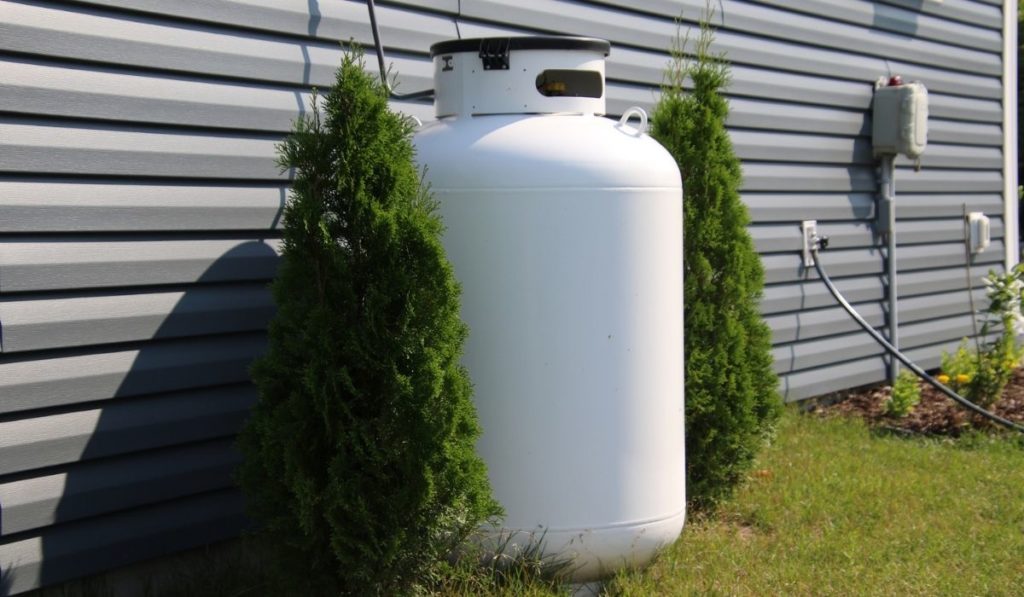
Propane tanks release dangerous carbon monoxide that can negatively affect the indoor air quality of your home. Make sure you never bring the tank inside your house, even if it’s extremely cold and you’re worried about the fuel freezing.
Purchase a Gas Detector
Gas detectors, like the Kidde Nighthawk (on Amazon), feature an alarm that informs everyone in the house of a gas leak. You must evacuate the area immediately and contact your propane technician if your gas detector goes off.
Clear Out Your Vents
A propane tank needs proper ventilation so that the carbon monoxide does not accumulate in your home. After not using the tank all summer, debris from nearby trees or animals can clog up your vents.
Make sure you clear out your ventilation system to allow an unobstructed flow of air. If you notice any blockages in your vents, hire a professional to inspect and clean the entire system.

